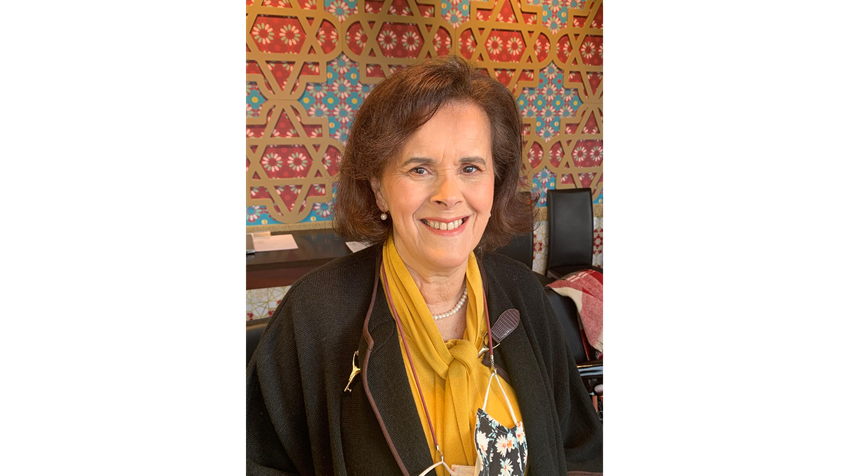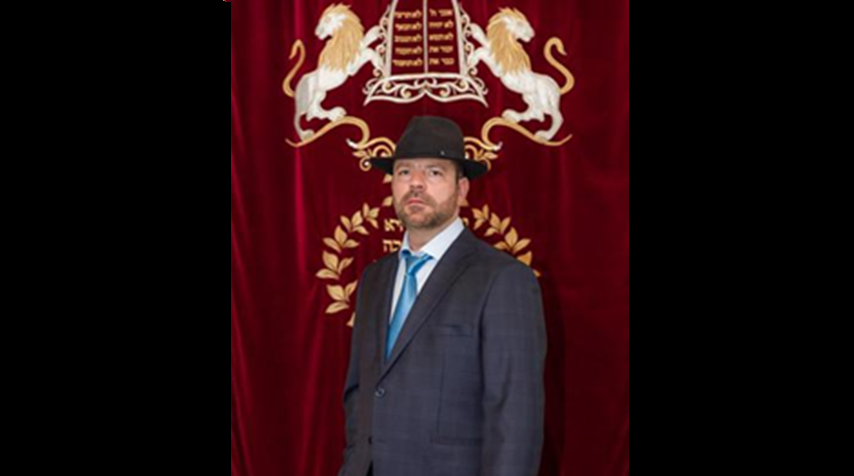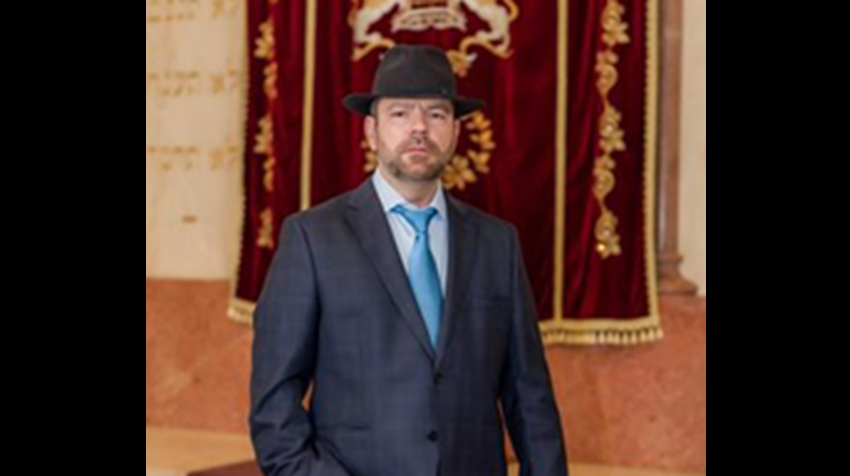Isabel Barros Lopes, Vice-President of the Jewish Community of Oporto.
Isabel Barros Lopes, the granddaughter of Captain Barros Basto, the founder of the Jewish Community of Oporto, agreed to give an interview to the Portuguese Jewish News about the life and death of her grandfather, as well as other current issues. Mother of three daughters and grandmother of three granddaughters, the current Vice-President of the Community is a friendly person who has been sought out and visited by historians, journalists and interested parties from all over the world for many years. This demand continues month after month. The fact that she is the granddaughter of the "Portuguese Dreyfus", a unique figure who was never sufficiently studied, is the reason for so much academic and journalistic interest.
Your grandfather died in 1961, when you were 7 years old but you were 35 when your grandmother died and 50 years old when your mother passed away. What did they say about your grandfather's mission, life and work for Judaism and Jewish culture?
– So many things. Both spoke of the subject with great pride and admiration.
With a military profession that consumed much of his time, how did Barros Basto manage to dedicate himself so passionately to the Jewish cause?
– My grandfather was obsessed with the strength that the Jewish community of Oporto and Portugal had had until the end of the fifteenth century and perhaps that is why he dedicated his energies to ensuring that history would repeat itself. I believe he spent his days and nights thinking about the Jewish cause. And when a man concentrates immensely on what he wants, sometimes even the impossible becomes possible.
Barros Basto had the ability to communicate and correspond with the Sephardic diaspora throughout the world. How was this possible?
– Those who knew him personally say that he had tremendous strength and that he thought of everything in world terms. Oporto was Portugal and Portugal was the world. On the other hand, he was a writer and researcher, he had an enormous capacity to write letters to the whole world, usually in French, which was the language he totally mastered, but also in English and even Hebrew. In the Jewish world of the 1920s and 1930s, the Jewish diaspora was already very connected to each other, so a contact with London quickly turned into contacts with the United States, Israel or even Hong Kong.
As your grandfather was a man with a life marked by hard work and the struggle for his daily bread, how do you explain the fact that he became a researcher and a writer of Jewish history in Portugal?
– He had a very impulsive spirit that urged him to investigate, study and write. Even today, national and international historians cite my grandfather's works on Portuguese Jews. From a young age, when he talked to his own grandfather, he meditated on the origins of his family, the history of the Jews in Portugal and the Jewish religion.
Was his idea of creating the chief rabbinate of Portugal, with the help of the rabbis of Gibraltar, influenced by the Azancots and the studies he did on the first chief rabbi of Portugal, Yahia ben Yaish?
– I think that my grandmother's relatives did not influence him more than the Rabbi in Lisbon at that time, whose name I do not remember now. My grandfather had long conversations with him, as well as with Moisés Amzalak and with several families in Lisbon.
What would it have been like for your grandfather, to officially refound a Jewish community in a city like Oporto after four centuries?
– A great happiness, I think. Returning from trench warfare, where you either kill or die, with the use of artillery and chemical weapons, he saw the official foundation of the Jewish community in Oporto as a mission of the soul and as something easy to do. We were in the middle of the First Republic, whose flag he himself had hoisted at the Oporto City Hall.
In those early years of the Jewish community in Oporto, religious services were celebrated by everyone in a small house, later replaced by another and yet another, that served as a synagogue. Do you remember your grandmother making any comments about that time and these services?
– Frankly I don't remember. The conversation has almost always been about the lethal project of those who, unable to produce anything useful in life, were able to destroy a man and his work. My grandmother and my mother left nothing written for posterity about what the community was like at its beginning. From what I remember, both were always worried about the fate of the synagogue and very angry with the unbridled persecution against my grandfather, moved by those who were afraid and envious of him and by the state powers of the time that contributed decisively to everything that happened and that will forever be linked to the "Portuguese Dreyfus case"
At that time, your grandfather was the only member of the community who was able to effectively promote Jewish culture, which he did with research, books, translations, conferences and more. Did the fact that the other members of the community were small merchants contribute to this?
– The community of my grandfather's time had small but also great merchants, or rather, small merchants who became great out of nothing. None of them, however, was very literate and so no one left anything written, unlike my grandfather who wrote dozens of works, in addition to how many he had already written even before the foundation of the community.
In the 1930s, the donations of the Sephardic diaspora that allowed the construction of the Kadoorie synagogue were interpreted as something absolutely extraordinary, since not even in Poland, then with millions of Jews, such large and majestic synagogues were erected. Do you believe that the diaspora wanted to implant in the city a symbol for the Jewish world?
– The international Jewish community believed that Portugal was a country with thousands of people who could return to Judaism. It was the perspective of my grandfather, who only in the 1940s stopped believing in it. Moreover, the Kadoorie family told us a decade ago that they always believed that, sooner or later, the synagogue would have a brilliant mission in the Jewish world, even if it failed to rescue the descendants of Jews.
Since your grandfather was so well informed in Jewish matters and so courageous as to inaugurate a synagogue facing the street at that time of antisemitism in Europe, how could he not foresee the attacks of envy, slander and mediocre people under anonymity?
– He was too optimistic and idealistic. He had no time to waste with people with bad tempers, much less did he fear any direct confrontation with them. He knew that he was collecting enemies, that envy against him was growing, but he maintained excessive optimism. He never believed that it would be possible for someone to destroy his work and his reputation. However, in life in society, things are not resolved as in the trenches. All it takes is a few anonymous letters from miserable people for all interested parties to join the attack, even agents of the State. It was the case. My friend Professor Elvira Mea once wrote that my grandfather managed to gather too many enemies against him, some close, some distant, and that it was fatal that he did not pay attention to this accumulation of people and organizations that wished him harm, especially because the State was waiting to humiliate him.
How did Barros Basto unite so many powers against him?
– He was seen as a threat to the installed corrupt system, as he was an independent man and was not afraid of anything. He came back from Flanders used to managing life in extremely difficult environments. He endured everything from human wickedness to forced separation. When he decided to build the largest synagogue in the country, the army drove him away from the city, sent him to Évora and then to Lamego. But he did not give in. He continued to work towards the same goals until he achieved them.
Was the case that led to Barros Basto's expulsion from the army, based on anonymous letters and the State's use of these denunciations to find evidence to harm your grandfather, traumatizing for the family?
– A lot. My mother used to say that at the end of his life he was on his knees crying. The perpetrators of this personal tragedy were never properly punished. My mother always kept me away from the synagogue, knowing the dangers that could befall me. But at the same time she was an extremely brave woman, she looked everyone in the eye, and she kept as her goals my grandfather's personal and professional rehabilitation and to honor the synagogue that he designed.
Was the death of his son Nuno in 1948 the decisive factor in Barros Basto's fall into depression?
– Undoubtedly. He was already very fragile and weakened after a decade and a half of persecution against him and the destruction of his personal, family and professional life. He loved his son Nuno. He wrote to the whole world to receive the medicines he needed. The Kadoorie family helped him at this stage as well. Unfortunately, all efforts were insufficient. Nuno's death was the culmination of unbearable heartbreak and sadness!
After the death of your grandfather, the community remained discreet and with Jewish life reduced to a few families. What do you remember? Did your grandmother and mother regret the decline of the community?
– Synagogues live fundamentally on religious services performed by men. My grandmother and mother were women, but they were always highly respected people in the synagogue. Little was done without listening to their opinion. It has always been like this, in the times of Nathan Beigel, Srul Finkelstein, Meyer Cymerman, Paul Pressman, Amílcar Paulo and others. So when my mother died two decades ago, Dara Jeffries called me to "pacify" the community, which was small but full of unbearable internal conflicts with the arrival of some people who wanted to convert to Judaism. Since then, I have been on successive boards of directors and what would be a retirement to rest has become an immense workload, which I maintain with the image of my grandfather as a guide.
Two decades ago, was not the synagogue an empty building?
– No. The community never fully died. Some were leaving, others were arriving. The idea that the synagogue was almost always an empty building is not part of my memories. When I was young and middle-aged, I often accompanied my grandmother and mother to synagogue. What I remember is that I have always attended weddings and other religious and cultural ceremonies where many dozens of people gathered, although they were probably the only times when they gathered in the synagogue. When we started receiving visits from schools, it was my mother who gave the lectures. Like my grandmother, she dedicated herself as much as she could to the community and everyone had the greatest respect for her, for what she represented as a family legacy. In addition, it must be said that my mother was a person of great physical courage, and “not one for jokes", as they say.
Do you know if your grandfather ever contacted Captain Alfred Dreyfus, who died in 1935? At that time Barros Basto was 48 years old.
– I don't know, I've never heard anyone mention it. Although they had lived at the same time, Dreyfus was much older. The rottenness of the French judicial system that allowed his conviction based on an anonymous letter occurred in the nineteenth century. Émile Zola denounced the case about 25 years before the official creation of the Jewish community of Oporto. It is possible that my grandfather wrote to Alfred Dreyfus and got no response. The large archive I keep is largely made up of replies to letters that my grandfather sent.
Like Alfred Dreyfus, your grandfather was persecuted by anonymous letters and agents of state. How many police officers searched your grandfather's house while he was alive?
– I don't know for sure, but I think there were a few, maybe two or three. I know that there was a policeman who was already greeting my mother and my uncle Nuno with a kiss. My grandmother used to say jokingly that they were friends who came to visit them.
How did you feel when in 2022 you was visited by the police at 8:00 am, brandishing anonymous complaints?
– A déjà vu. A report of the management concerning these facts describes the situation with the word ‘unbelievable’, but in a way it was nothing new.
How many police officers visited your home?
– There were 12 people who had nothing more important to do that day. In addition to these, many others walked into the synagogue, into the museum and into law offices that did not even exist.
What would your grandfather say?
– Perhaps he would say: record everything, document everything!
Since your grandfather was a man of culture, what would he say, if he knew that today the community has a Jewish museum, an Holocaust museum, has produced history films, literature, painting and everything that makes it a complete organization in cultural terms?
– Great work!
What would he say if he knew that, instead of one synagogue, the community now keeps Jewish life alive in two synagogues at the same time, five kilometers apart and with a minain for 10 consecutive years?
– Great rebirth of the Jewish community of Oporto!
How is it possible to produce so much?
– The community is managed by people who have fulfilled themselves personally and professionally before having dedicated their lives to the promotion of Jewish religion and culture. That makes all the difference. From international election observers and writers to PhDs in mathematics and clinical psychology and a leader of the European Jewish Association, we have a little bit of everything, even a board member who was born on the same day as my grandfather and who for now has no successor to ensure regulatory legality and the good results of all our more than twenty departments. There are Jewish organizations in the United States, Europe, Eurasia and elsewhere that, with much more economic capacity than the Oporto Community, have done much less in terms of promoting culture, history, religion, human rights and philanthropy for genuinely Jewish causes. Obviously there are those who hate so much success and independence, especially because all of this is documented, recorded and published. But this is part of life. There are those who produce and those who hate.
Even today, scholars and visitors from all over the world visit the city and seek to speak with you personally about the history of your grandfather, Captain Barros Basto. How do you feel about it?
– Proud and happy that people value and do not forget my grandfather's work despite a coalition of forces having destroyed it.


































